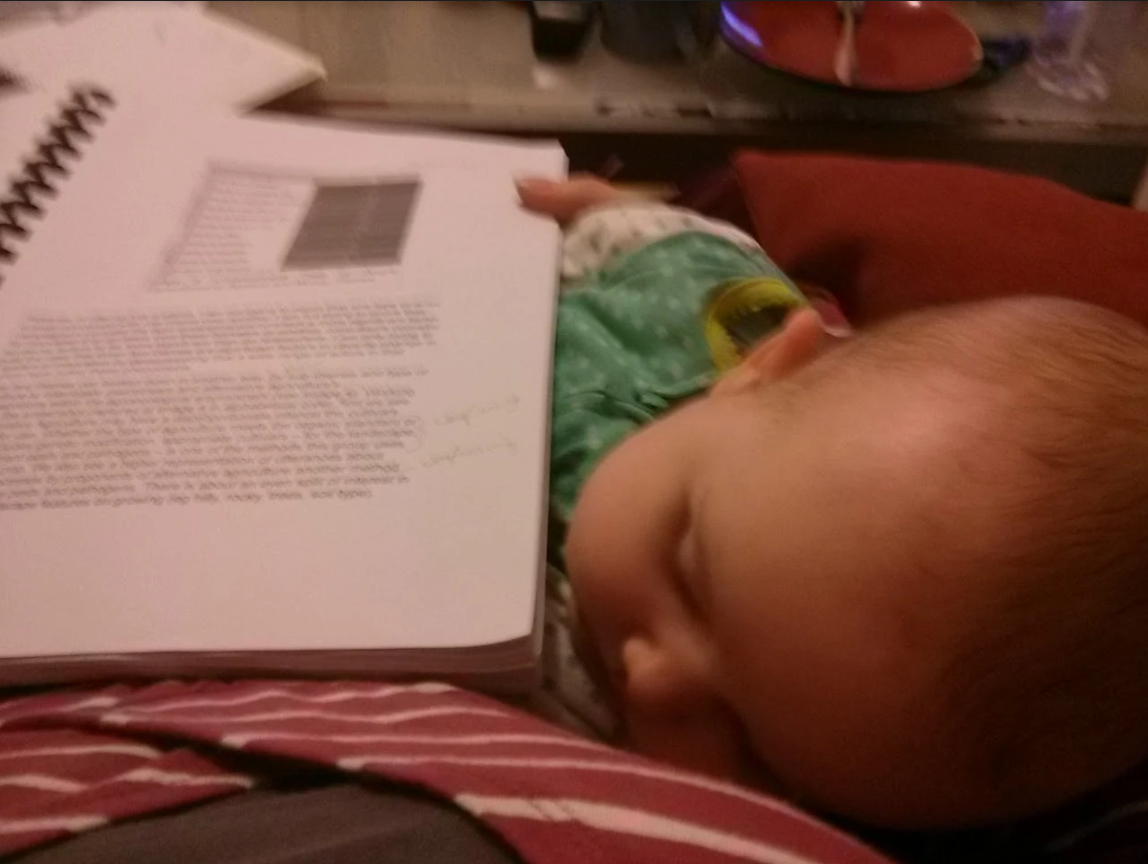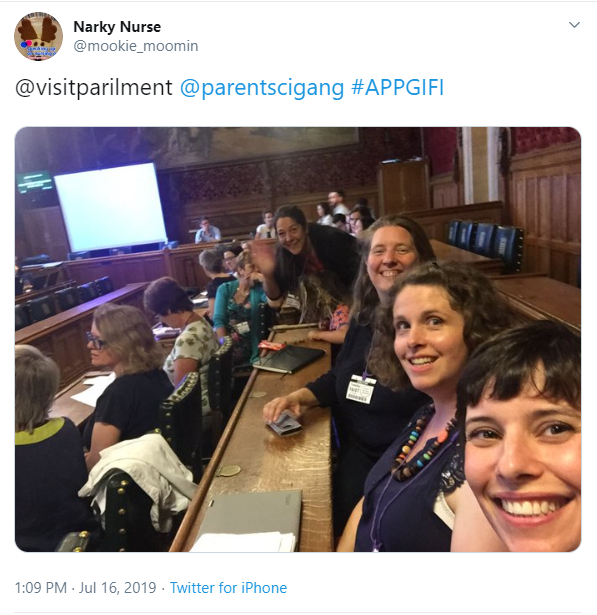Parenting Science Gang
When I went on maternity leave in August 2017 I had a vague notion that I should do some volunteering during this break from my regular work. Crazy, I know, but from experience with my first child, I spent a lot of time with a sleeping or breastfeeding baby in my lap, an internet-connected smartphone in one hand and a cup of tea in the other.

PhD dissertation on the left and a sleeping baby on the right
Baby #2 was born without too much fuss. September, October, November, December came and went quickly. In January 2018 I was lurking on my local parenting Facebook group (probably while breastfeeding) when someone posted a blog from the Wellcome-funded citizen science project Parenting Science Gang. I had a nose around their interviews with various experts (eg, did you know your GP probably has about 5 minutes training on breastfeeding). I also read a series of interviews with academic researchers on breastfeeding and designing qualitative research and I was hooked!
Parenting Science Gang had seven subgroups with more than 2600 members on parenting topics including breastmilk, breastfeeding, baby slings, picky eating, high BMI in pregnancy, gender stereotypes and flexischooling. It had a core team of a project director (
Sophia Collins), two project facilitators (
Rebecca Brueton) and (
Tamasin Greenough Graham), and a project manager (
Amy Strother).
I found Parenting Science Gang’s Facebook group on breastfeeding and healthcare experiences, joined and started helping plan not one, but two, parent-designed social research projects. An introduction is available here.
The first strand was a qualitative into quantitative study using linguistic analysis to analyse free-text stories received from breastfeeding mums about interactions with their healthcare providers. Gavin Brookes, a linguist who has previously used corpus linguistics in healthcare research2 was the friendly scientist that helped design this project and led the technical part of the linguistic analysis (corpus linguistics uses software to study word frequencies and co-locations to summarise the messages in a large body of text). More than 700 mums sent their stories in three weeks! The preliminary analysis is available here.
The second strand was more qualitative: healthcare practitioners interviewed each other in peer to peer interviews on their experiences of breastfeeding and how that affected their professional practice. Spoiler - it improved how they cared for breastfeeding mums (preliminary results available here). Yan-Shing Chang, a lecturer on child health, supported the qualitative strand.
Why Volunteer?
Volunteering with Parenting Science Gang combined two things I get excited about: 1. breastfeeding support and 2. social research. I've been a contributing member in my local breastfeeding Facebook group (Breastfeeding Berkshire) since 2014 when my first child was born. I've not been motivated enough to train to be a breastfeeding counsellor but give me the chance to design qualitative research *about* breastfeeding? That's fun and something I'll do at 8pm on a Saturday night (while breastfeeding the baby to sleep). More than a year later I'm still involved in finalising the projects and also in disseminating their results.
What I did:
- Participated in Facebook discussions about how to explore breastfeeding healthcare experiences (eg quantitative or qualitative)
- Wrote a first draft of a research proposal (for feedback from friendly academics)
- Helped fill in the form for ethical approval from York University (Sarah West was a contact there and one of the project’s evaluators)
- Helped write and tweak survey questions
- Rendered a first electronic version of the survey
- Helped publicise the survey once it was live
- Made a science poster for Parenting Science Gang’s final event
- Acted as a qualitative analyst on the qualitative strand
- Wrote the first draft of the qualitative analysis.
- Helped write science posters for recent healthcare conferences (Institute of Health Visitors).
So this might sound like a lot, and you'd be partly right. I'd estimate I've given Parenting Science Gang half a day a week of my time since joining in Jan 2017. But what I didn't have was responsibility for getting the research done. That was Rebecca Brueton, Parenting Science Gang project facilitator.
What next?
In July 2019, I helped present the findings to the All Party Parliamentary Group on Infant Feeding Inequalities. Parenting Science Gang attended one of their meetings before I started volunteering and were invited back to present future findings. This monthly meeting is held in the Houses of Common and is convened by Alison Thewliss, MP for Glasgow. The audience is mostly breastfeeding counsellors, breastfeeding researchers and breastfeeding advocates. They loved our work. La Leche League tweeted my slide on breastfeeding improving healthcare provision and we had an offer to write up PSG’s breastmilk study results for television when they are formally published.

I’ve also added this experience to the research section on my CV. And I've suggested to my local breastfeeding Facebook group that we conduct our own citizen science research! Onwards and upwards!
Bio
Sophie Payne-Gifford is a social scientist based at the University of Hertfordshire, although she usually focuses on food and environmental issues. She probably wrote this while breastfeeding her toddler to sleep. No, she doesn't judge you if you didn't breastfeed. But if you wanted to, and didn't get the hang of it, she's got your back.
Contact: [email protected]
_________________________________________________________________________
1 This is not meant to make any parents feel inadequate about the amount of stuff they get done. I’m fortunate to be in a position where I am able to volunteer and like every parent, I never feel like I am getting ‘everything’ done.
2 Brookes, G and McEnery, T. (2017) How to interpret large volumes of patient feedback: methods from computer-assisted linguistics. Social Research Practice, Issue 4, pp. 2-13. Pdf available at: http://the-sra.org.uk/wp-content/uploads/SRA_Social_Research_Practice_Journal_Issue_04-summer-2017.pdf.